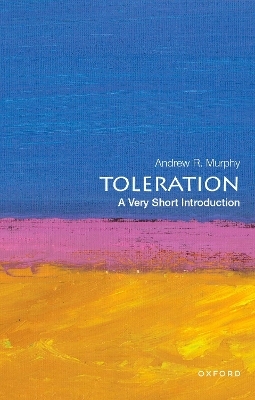
Toleration: A Very Short Introduction
Seiten
2025
Oxford University Press Inc (Verlag)
978-0-19-766495-7 (ISBN)
Oxford University Press Inc (Verlag)
978-0-19-766495-7 (ISBN)
- Lieferbar (Termin unbekannt)
- Portofrei ab CHF 40
- Auch auf Rechnung
- Artikel merken
Toleration is one of the most foundational and contentious concepts in contemporary political discourse. Although its modern origins lie in the realm of religious dissent, toleration remains one of our most contentious and broad-ranging concepts, invoked in today's debates about race, gender, religion, sexuality, cultural identity, free speech, and civil liberties. Questions of toleration arise wherever unpopular groups face hostile environments and stand in need of protection from state interference or the actions of their neighbors.
Toleration can seem counterintuitive at first glance, since it involves a complex mixture of rejection and acceptance, combining disapproval - of particular individuals, groups, beliefs, and practices - on the one hand with legal and political guarantees for such groups on the other. Toleration has long been considered a cardinal virtue of liberalism, endorsed by central figures such as Locke, Mill, and Rawls. Although toleration has been criticized as unduly minimal, compared with more expansive terms such as recognition or acceptance, it has routinely played a key role in the protracted struggles of marginalized groups of various sorts (a necessary, if not always sufficient, condition for liberty). Toleration: A Very Short Introduction will concisely canvass the history, development, and contemporary global status of toleration as both a concept and a contested political and legal practice.
Toleration can seem counterintuitive at first glance, since it involves a complex mixture of rejection and acceptance, combining disapproval - of particular individuals, groups, beliefs, and practices - on the one hand with legal and political guarantees for such groups on the other. Toleration has long been considered a cardinal virtue of liberalism, endorsed by central figures such as Locke, Mill, and Rawls. Although toleration has been criticized as unduly minimal, compared with more expansive terms such as recognition or acceptance, it has routinely played a key role in the protracted struggles of marginalized groups of various sorts (a necessary, if not always sufficient, condition for liberty). Toleration: A Very Short Introduction will concisely canvass the history, development, and contemporary global status of toleration as both a concept and a contested political and legal practice.
Andrew R. Murphy is Professor of Political Science at the University of Michigan . He is the author of Liberty, Conscience, and Toleration: The Political Thought of William Penn and William Penn: A Life.
Chapter 1: Introducing Toleration
Chapter 2: Antecedents and Alternatives: Toleration Before and Beyond the Reformation
Chaoter 3: Establishing Toleration: Reformation and Early Modern Foundations
Chapter 4: Beyond Toleration? Enlightenment Extensions, Expansions, and Implications
Chapter 5: Extensions and Controversies: Colonial and Imperial Complications
Chapter 6: Contesting and Defending Toleration in the 20th and 21st Centuries
Chapter 7: The Future of Toleration?
Further Reading
Index
| Erscheinungsdatum | 11.12.2024 |
|---|---|
| Reihe/Serie | Very Short Introductions |
| Zusatzinfo | 10 bw |
| Verlagsort | New York |
| Sprache | englisch |
| Maße | 111 x 175 mm |
| Themenwelt | Geisteswissenschaften ► Philosophie |
| Geisteswissenschaften ► Religion / Theologie | |
| Recht / Steuern ► Allgemeines / Lexika | |
| Recht / Steuern ► EU / Internationales Recht | |
| ISBN-10 | 0-19-766495-4 / 0197664954 |
| ISBN-13 | 978-0-19-766495-7 / 9780197664957 |
| Zustand | Neuware |
| Informationen gemäß Produktsicherheitsverordnung (GPSR) | |
| Haben Sie eine Frage zum Produkt? |
Mehr entdecken
aus dem Bereich
aus dem Bereich
wie Philosophie uns helfen kann, unseren Weg zu finden
Buch | Hardcover (2023)
dtv Verlagsgesellschaft
CHF 39,90


